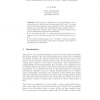Free Online Productivity Tools
i2Speak
i2Symbol
i2OCR
iTex2Img
iWeb2Print
iWeb2Shot
i2Type
iPdf2Split
iPdf2Merge
i2Bopomofo
i2Arabic
i2Style
i2Image
i2PDF
iLatex2Rtf
Sci2ools
CIE
2005
Springer
2005
Springer
The Transfinite Action of 1 Tape Turing Machines
• We produce a classification of the pointclasses of sets of reals produced by infinite time turing machines with 1-tape. The reason for choosing this formalism is that it apparently yields a smoother classification of classes defined by algorithms that halt at limit ordinals. • We consider some relations of such classes with other similar notions, such as arithmetical quasi-inductive definitions. • It is noted that the action of ω many steps of such a machine can correspond to the double jump operator (in the usual Turing sense): a−→ a . • The ordinals beginning gaps in the “clockable” ordinals are admissible ordinals, and the length of such gaps corresponds to the degree of reflection those ordinals enjoy.
| Added | 26 Jun 2010 |
| Updated | 26 Jun 2010 |
| Type | Conference |
| Year | 2005 |
| Where | CIE |
| Authors | Philip D. Welch |
Comments (0)

